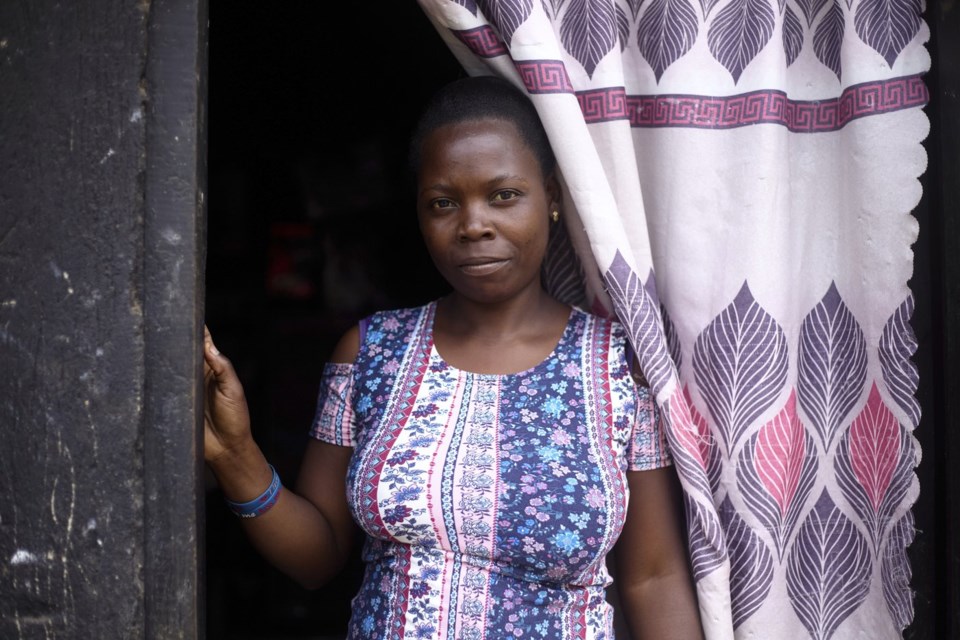KAMPALA, Uganda (AP) — Alice Nekesa did not know she was infected with malaria-causing parasites until it was too late. She was in the fourth month of pregnancy last year when she started bleeding, a miscarriage later attributed to untreated malaria in her.
The Ugandan farmer said recently that she regretted the loss of what would have been her second child “because I didn’t discover malaria and treat it early.”
Variations of such cases are commonly reported by Ugandan health workers who witness stillbirths or feverish babies that die within days from undiagnosed malaria. The deaths are part of a wider death toll tied to the mosquito-borne disease, the deadliest across Africa, but one easily treated in adults who seek timely medical care.
Until recently, a major gap in malaria treatment was how to care for newborns and infants infected with malaria who weren’t strong enough to receive regular medication. That changed last month when Swiss medical regulators approved medicine from the Basel-based pharmaceutical company Novartis for babies weighing between 2 and 5 kilograms (nearly 4 1/2 to 11 pounds).
Swissmedic said the treatment, a sweet-tasting tablet that disperses into a syrup when dropped into water, was approved in coordination with the World Health Organization under a fast-track authorization process to help developing countries access much-needed treatment.
Africa’s 1.5 billion people accounted for 95% of an estimated 597,000 malaria deaths worldwide in 2023, according to the WHO. More than three-quarters of those deaths were among children.
In Uganda, an east African country of 45 million people, there were 12.6 million malaria cases and nearly 16,000 deaths in 2023. Many were children younger than 5 and pregnant women, according to WHO.
Nigeria, Congo and Uganda — in that order — are the African countries most burdened by malaria, a parasitic disease transmitted to humans through the bites of infected mosquitoes that thrive and breed in stagnant water.
The drug approved by Swiss authorities, known as Coartem Baby in some countries and Riamet Baby in others, is a combination of two antimalarials. It is a lower dose version of a tablet previously approved for other age groups, including for older children. Before Coartem Baby, antimalarial drugs designed for older children were administered to small infants with careful adjustments to avoid overdose or toxicity.
Ugandan authorities, who have been working to update clinical guidelines for treating malaria, say the new drug will be rolled out as soon as possible. It is not yet available in public hospitals.
The development of Coartem Baby has given hope to many, with local health workers and others saying the medicine will save the lives of many infants.
Ronald Serufusa, the top malaria official for the district of Wakiso, which shares a border with the Ugandan capital of Kampala, said he believes Coartem Baby will be available “very, very soon” and that one priority is sensitizing the people adhering to treatment.
Some private pharmacies already have access to Coartem Baby, “flavored with orange or mango” to make it palatable for infants, he said.
During the so-called malaria season, which coincides with rainy periods twice a year, long lines of sick patients grow outside government-run health centers across Uganda. Many are often women with babies strapped to their backs.
Health workers now are trained to understand that “malaria can be implicated among newborns,” even when other dangerous conditions like sepsis are present, Serufusa said.
“If they don’t expand their investigations to also suspect malaria, then it goes unnoticed,” he said, speaking of health workers treating babies.
The Malaria Consortium, a global nonprofit based in London, in a statement described the approval of Coartem Baby as “a major leap forward for saving the lives of young children in countries affected by malaria.”
In addition to Uganda, the drug will be rolled out in Burkina Faso, Côte d’Ivoire, Kenya, Malawi, Mozambique, Nigeria, and Tanzania, the group said.
Jane Nabakooza, a pediatrician with Uganda's malaria control program, said she expects the government will make Coartem Baby available to patients free of charge, even after losing funding when the U.S. shrank its foreign aid program earlier this year.
Some malaria funding from outside sources, including the Global Fund to Fight AIDS, Malaria and Tuberculosis, remains available for programs such as indoor spraying to kill mosquitoes that spread the malaria-causing parasite.
Because of funding shortages, “we are focusing on those that are actually prone to severe forms of malaria and malaria deaths, and these are children under 5 years,” she said.
___
The Associated Press receives financial support for global health and development coverage in Africa from the Gates Foundation. The AP is solely responsible for all content. Find AP’s standards for working with philanthropies, a list of supporters and funded coverage areas at AP.org.
Patrick Onen And Rodney Muhumuza, The Associated Press



